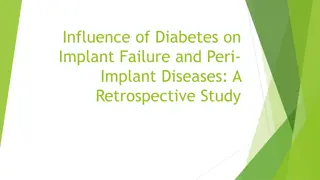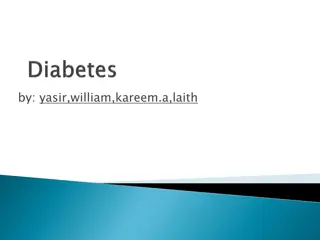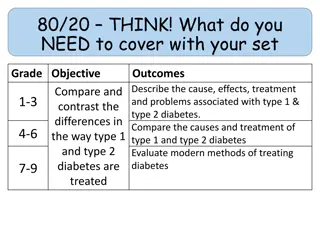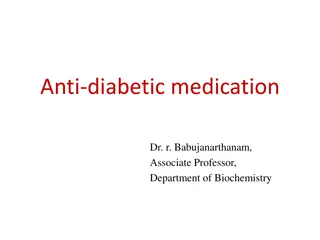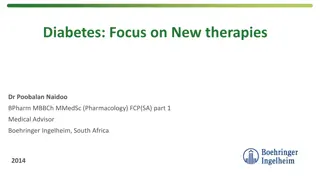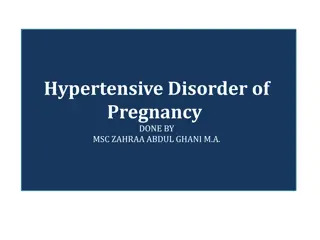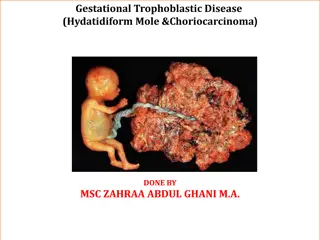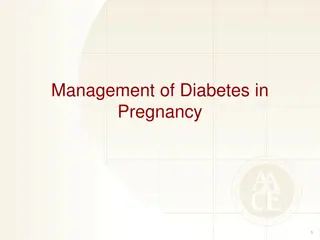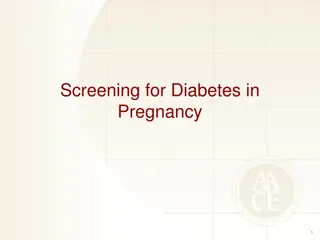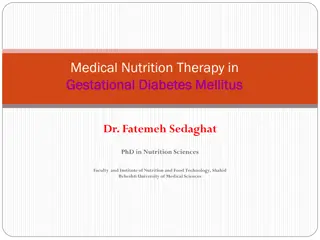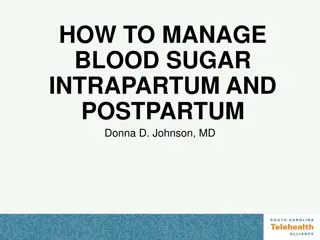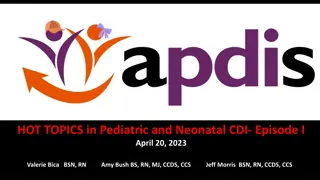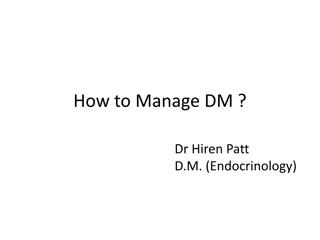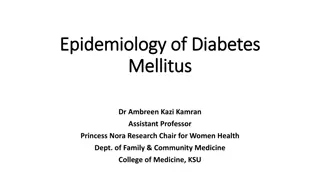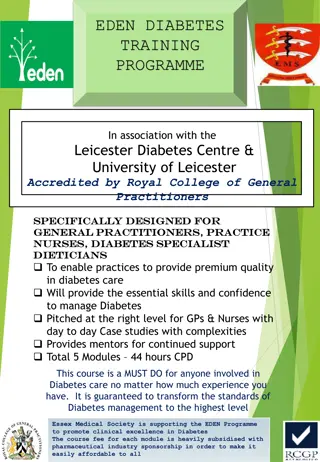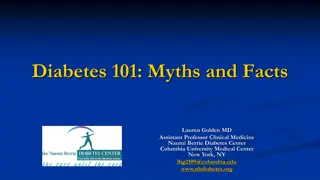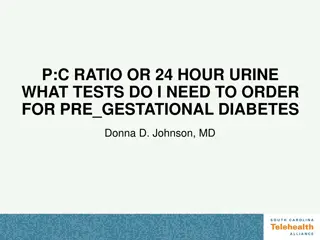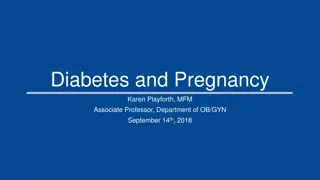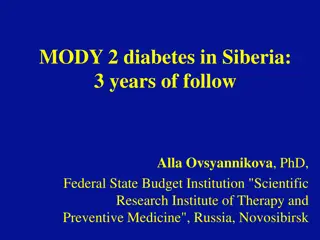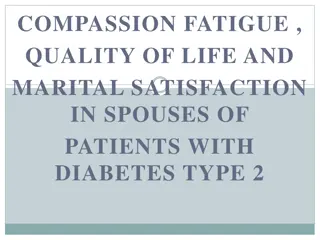Understanding Gestational Diabetes: Risk Factors, Diagnosis, and Management
Gestational diabetes is a condition where high blood sugar levels develop during pregnancy in women without pre-existing diabetes. Risk factors include maternal age, family history of diabetes, ethnicity, and obesity. Diagnostic tests involve measuring blood glucose levels, and management includes a
1 views • 15 slides
Understanding How Diabetes Affects Blood Vessels
Diabetes can harm blood vessels, leading to complications due to high blood sugar levels. Hemoglobin A1c plays a crucial role in monitoring glucose control, with values above 6.5% indicating diabetes. Over time, high blood sugars can damage blood vessels, affecting blood flow and increasing the risk
1 views • 19 slides
Understanding the Relationship Between Mental Health and Diabetes: Insights for Educators
Exploring the link between mental health issues and diabetes, this presentation by Dr. Mary de Groot discusses the implications for diabetes educators. It delves into the prevalence of mental health conditions in people with diabetes, screening, treatment options, and interrelationships between diab
5 views • 45 slides
Lower Your Patients' Risk of Type 2 Diabetes with CDC's National DPP Lifestyle Change Program
Lower the risk of type 2 diabetes in your patients by implementing the CDC's National Diabetes Prevention Program (National DPP). This evidence-based lifestyle change program focuses on healthy eating and physical activity, helping participants make lasting changes to prevent or delay type 2 diabete
3 views • 11 slides
Influence of Diabetes on Implant Failure and Peri-Implant Diseases: A Retrospective Study
In this retrospective study, the authors investigate the impact of diabetes on the occurrence of peri-implant diseases and post-operative complications at implant sites. The study aims to evaluate the relationship between diabetes and biological complications, specifically peri-implantitis, and asse
0 views • 22 slides
Understanding Diabetes: Causes, Symptoms, and Prevention
Diabetes is a chronic illness affecting how our bodies convert food into energy. It is characterized by high blood sugar levels due to insufficient insulin production or resistance. Symptoms include increased thirst, hunger, and fatigue. Genetics, lack of physical activity, and unhealthy eating habi
0 views • 8 slides
Understanding Diabetes: Type 1 vs. Type 2, Causes, Treatments, and Modern Methods
Explore the differences between type 1 and type 2 diabetes, including causes, effects, treatments, and associated problems. Compare the causes and treatments of both types of diabetes while evaluating modern methods of treatment. Understand the symptoms, lifestyle factors, and risk factors related t
0 views • 18 slides
Psychiatric Consultation for Diabetes: Enhancing Care at the Intersection of Mental and Physical Health
This presentation by Dr. James K. Rustad explores the critical role of consultation-liaison psychiatrists in managing diabetes along with mental health conditions like schizophrenia. It delves into the prevalence of diabetes, particularly among specific demographic groups, and highlights the complex
0 views • 35 slides
Understanding the Impact of Diabetes on Vision
Diabetes can have a significant impact on eye health, leading to conditions like retinopathy, glaucoma, cataract, and changes in refractive errors. Nearly 5% of Australians have diabetes, with a high risk of developing related eye problems. Recognizing early signs such as blurred or fluctuating visi
0 views • 15 slides
Senior Wellness Presentation: Managing Diabetes Through Exercise
Explore the benefits of exercise in managing diabetes for seniors, including tips on starting an exercise routine and preventing health issues associated with diabetes. Discover how exercise can improve insulin sensitivity and overall well-being for individuals with Type 2 Diabetes. The presentation
0 views • 14 slides
Overview of Anti-Diabetic Medication and Treatment Options
Anti-diabetic medications are used to treat diabetes by lowering glucose levels in the blood. There are various classes of drugs such as insulin, sensitizers, secretagogues, and more, each targeting different aspects of diabetes management. Type 1 diabetes requires insulin injections, while Type 2 d
0 views • 5 slides
Understanding Diabetes: Types, Causes, and Prevention
Diabetes is a disease that affects how the body uses glucose, the main source of fuel. There are two main types of diabetes – Type 1 and Type 2. In Type 1 diabetes, the pancreas fails to produce insulin, while in Type 2, the body's cells do not respond properly to insulin. Uncontrolled diabetes ca
1 views • 14 slides
New Therapies for Diabetes: A Focus on Prevention and Treatment
Explore the impact of diabetes worldwide and in South Africa, with a particular focus on the epidemiology, consequences, and current therapies for Type 2 diabetes. Dr. Poobalan Naidoo discusses the increasing prevalence of diabetes and the urgent need for new therapeutic approaches to combat this gr
0 views • 35 slides
Understanding Hypertensive Disorders of Pregnancy
Hypertensive disorders of pregnancy, including gestational hypertension and preeclampsia, pose significant risks to both the mother and fetus. Gestational hypertension is characterized by elevated blood pressure after 20 weeks of gestation, while preeclampsia involves hypertension with end-organ man
1 views • 22 slides
Understanding Gestational Trophoblastic Disease: Hydatidiform Mole & Choriocarcinoma
Gestational trophoblastic disease encompasses hydatidiform mole, invasive mole, and choriocarcinoma. This condition involves abnormal fertilization of the oocyte, resulting in various presentations including abnormal growth of the uterus, severe nausea, vaginal bleeding, and symptoms resembling hype
1 views • 9 slides
Managing Diabetes in Pregnancy: Preconception and Post-conception Care
Providing preconception care for women with established type 1 or type 2 diabetes is crucial for ensuring a healthy pregnancy. This involves counseling on effective contraception, evaluating and treating diabetes-related complications, reviewing risks of uncontrolled diabetes during pregnancy, and d
0 views • 37 slides
Understanding Diabetes and Its Management in Students
Diabetes is a chronic condition characterized by high blood sugar levels. This article discusses the management and safety of students with diabetes, highlighting the types and classifications of diabetes, differences between Type 1 and Type 2 diabetes, and the presentations of diabetes. It emphasiz
1 views • 42 slides
Priorities and Quality Measures for Type 2 Diabetes Care in NHS GGC
Dr. Kashif Ali leads primary care for Type 2 diabetes, while Dr. James Boyle oversees secondary care in NHS GGC. The data from December 2018 shows the number of Type 2 diabetes patients, their care processes, HbA1c levels, and BMI status. The Diabetes Quality Improvement and Outcome Measures aim to
0 views • 27 slides
Comprehensive Guide to Diabetes Screening in Pregnancy
This comprehensive guide covers the screening, diagnosis, and management of diabetes in pregnancy, including gestational diabetes mellitus (GDM). It includes information on criteria for early prenatal diabetes testing, approaches for diagnosing GDM, and diagnostic criteria for oral glucose tolerance
0 views • 4 slides
Understanding Pregnancy-Induced Hypertension and Gestational Hypertension
Pregnancy-induced hypertension, also known as gestational hypertension, can pose risks to both the mother and the fetus. This condition, characterized by high blood pressure during pregnancy, can lead to complications such as preeclampsia. Learn about the causes, symptoms, and differences between th
0 views • 24 slides
Gestational Diabetes Mellitus: Overview and Risk Factors
Gestational Diabetes Mellitus (GDM) is defined as any level of glucose intolerance first detected during pregnancy, affecting approximately 7% of pregnancies globally. In Iran, GDM prevalence varies between 1.3% to 10%. Factors like age, BMI, weight gain, and family history influence GDM development
8 views • 50 slides
Managing Blood Sugar Levels During Pregnancy and Postpartum
This helpful guide by Dr. Donna D. Johnson provides detailed insights on managing blood sugar levels for women with gestational diabetes mellitus (GDM), type 2 diabetes, and type 1 diabetes during pregnancy and postpartum. It covers medication adjustments, monitoring criteria, and specific recommend
0 views • 8 slides
Understanding the Coding Guidelines for Preterm Newborns with Small for Gestational Age (SGA)
Explore the guidelines for coding preterm newborns who are small for gestational age, including birth weight considerations and criteria for assigning appropriate ICD-10 codes. Gain insights into differentiating SGA from low birth weight and effectively documenting neonatal cases.
0 views • 17 slides
Understanding Gestational Diabetes Mellitus
Gestational Diabetes Mellitus (GDM) is a condition of glucose intolerance in pregnancy, characterized by hyperglycemia. It poses risks to both mother and baby, including macrosomia, birth trauma, neonatal complications, and long-term complications. The diagnosis of GDM involves criteria set by WHO i
0 views • 15 slides
Managing Diabetes: Dr. Hiren Patt’s Expert Advice for Mr. Patel
Dr. Hiren Patt, an Endocrinologist, guides a 24-year-old male named Mr. Patel through tests, diagnosis, and management of diabetes. The consultation covers understanding diabetes types, testing procedures, lifestyle changes, ideal weight recommendations, and dispelling myths about curing diabetes. D
0 views • 29 slides
Overview of Diabetes Mellitus: Types, Diagnosis, and Epidemiology
Diabetes Mellitus is a metabolic disorder characterized by chronic hyperglycemia. It includes Type 1, Type 2, Gestational, Secondary, and Pre-diabetes. Diagnosis involves symptoms like thirst, frequent urination, and weight loss, along with specific glucose tests. Understanding the types, diagnostic
0 views • 30 slides
Diabetes Audit 2017/18 Summary for Cambridgeshire and Peterborough CCG
The 2017/18 National Diabetes Audit for Cambridgeshire and Peterborough CCG reveals that 46,695 people are registered with diabetes in the region, with similar profiles to England. The audit shows disparities in diabetes registrations based on age and deprivation levels, and highlights improvements
0 views • 9 slides
Comprehensive Diabetes Training Programme for Healthcare Professionals
This accredited EDEN Diabetes Training Programme, supported by Essex Medical Society, offers essential skills and confidence to manage diabetes effectively. Specifically designed for GPs, nurses, and dieticians, the course covers a range of modules to elevate healthcare providers' ability in diabete
0 views • 4 slides
Comprehensive Overview of Rush Copley Outpatient Diabetes Center
The Rush Copley Outpatient Diabetes Center, led by Donna Carter RN, CDE, offers a rich history of diabetes treatment, from ancient practices to modern advancements. With a focus on patient education and management, the center serves various diabetes types and provides specialized care, including ins
0 views • 18 slides
Understanding Diabetes: Information for School Personnel
Diabetes is a condition where the body struggles to produce or utilize insulin effectively, leading to high blood sugar levels. This guide provides an overview of diabetes, differences between Type 1 and Type 2, managing diabetes, necessary supplies, and the needs of students with diabetes in a scho
0 views • 11 slides
Understanding Diabetes Mellitus: Causes, Effects, and Management
Diabetes Mellitus is a condition characterized by high blood sugar levels due to insufficient insulin production or utilization. It affects various organs and requires careful management through lifestyle changes, medication, or insulin therapy. While the exact causes are still being researched, fac
0 views • 18 slides
Debunking Common Myths About Diabetes
Diabetes can't be solely attributed to sugar consumption. Genetics and insulin resistance play significant roles. Understanding the criteria for diagnosing diabetes, pre-diabetes, and the importance of the Hemoglobin A1C test are crucial in managing the condition. This article sheds light on prevale
0 views • 18 slides
Meeting the Challenge of Diabetes in China: Prevalence, Trends, and Geographic Variances
This comprehensive study examines the prevalence, trends, and geographic variances of diabetes in China compared to the United States. With a focus on diabetes and prediabetes rates, the analysis spans over two decades, highlighting the significant burden of the disease in the Chinese population. Th
0 views • 24 slides
Understanding Diabetes-Related Liver Diseases and Their Diagnostic Criteria
Explore the various liver diseases associated with diabetes, such as Glycogenic Hepatopathy, Diabetic Hepatosclerosis, and Hepatogenous Diabetes, along with their etiology, diagnosis, and management. Learn about rare conditions like Glycogenic Hepatopathy characterized by glycogen accumulation and h
0 views • 36 slides
Comprehensive Testing Recommendations for Pre-Gestational Diabetes Management by Dr. Donna D. Johnson, MD
Routine prenatal labs, including screening for asymptomatic bacteriuria, hemoglobin A1C, basic tests like BMP and TSH, and frequency of tests such as HbA1C, home glucose monitoring, urine ketones, and serum creatinine are crucial for managing pre-gestational diabetes. Additional assessments like dil
0 views • 7 slides
Diabetes and Pregnancy: Impact, Complications, and Management
This presentation delves into the potential impact of metabolic syndrome and diabetes on women's reproductive health. It covers topics such as preconception counseling for patients with preexisting diabetes mellitus, complications associated with poorly controlled diabetes in pregnancy, baseline eva
0 views • 31 slides
Understanding MODY Diabetes: Characteristics and Prevalence in Russia
Maturity-Onset Diabetes of the Young (MODY) is a monogenic form of diabetes that often manifests before the age of 25, with distinct clinical features and modes of inheritance. In Siberia, Russia, MODY prevalence and its various subtypes have been a subject of research, shedding light on its unique
0 views • 32 slides
Understanding Compassion Fatigue in Spouses of Type 2 Diabetes Patients
Compassion fatigue, a common phenomenon among spouses of individuals with type 2 diabetes, can impact quality of life and marital satisfaction. India faces a significant burden of diabetes, with a rising number of cases and high associated costs. The country also experiences an alarming trend of you
0 views • 26 slides
Protecting Against Flu: Education for People with Diabetes
Diabetes UK emphasizes the importance of influenza vaccination for individuals with diabetes to reduce the risk of severe complications. In the midst of the unique challenges posed by the 2020 flu season and the ongoing pandemic, efforts were made to increase awareness, encourage early vaccination a
0 views • 13 slides
Insights on Diabetes: Age, Gender, Awareness, and Symptoms
Varied insights on diabetes include age distribution, gender representation, awareness levels, knowledge of diabetes types, personal connections to individuals with diabetes, and familiar symptoms experienced upon diagnosis. The data visualizations provide a comprehensive view of these aspects, shed
0 views • 14 slides




